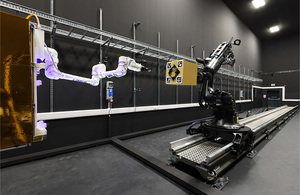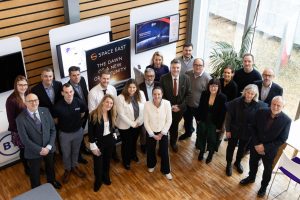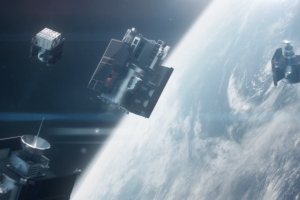The funding is to develop and evaluate an ultra-low-light camera system, which is suitable for use in a range of compact Earth observation instruments in the visible and NIR wavelengths.
XCAM hopes it will lead to the development of a very high resolution, multi-spectral imaging instrument that “will transform the way we monitor our Earth” in the future. This will be for applications such as solar induced fluorescence effects, night-time imaging for development goals, polar ice mapping, and thermospheric wind speed monitoring.
The project will use newly-developed high frame rate sensors from BAE Systems, which is collaborating with XCAM. Specifically, the HWK4123 ultra-low noise image sensors, capable of imaging in starlight conditions. These will be integrated into XCAM’s ‘Nuscis’ camera system for space imaging applications.
This is described as involving a new, experimental, small satellite format, which will be suitable for a range of Earth observation applications.
Once the new system has been developed, the company says it will perform system characterisation against a number of use-cases and project partners (the Centre for Electronic Imaging at the Open University) and will also conduct radiation tests to make it ready for space use.
Note, that we reported in August that XCCAM was awarded grant funding from the UKSA, via its International Bilateral Fund (IBF) – Phase 1, to develop next generation X-ray instrumentation for the study of space weather. This is separate to the latest announcement.
Export
“We welcome this valuable grant funding and the partnership generated with BAE Systems, which will lead to an increase in sales for our unique specialist camera systems into our global export markets,” said Karen Holland, CEO of XCAM.
“We hope to prove through this project that these new sensitive, ultra-low-noise sensors alongside our camera system will transform the performance of compact space imaging cameras leading to new ways of monitoring our planet from space.”
An early adopter for the system has already been identified, in the form of Michigan Aerospace Corporation.
“Michigan Aerospace is pleased to support XCAM’s efforts to ruggedize low-noise CMOS detectors for space applications,” said the company’s president, Jane Pavlich, President.
“The work that XCAM is undertaking will enable sensitive low-noise cameras to be available for small form factor satellites that enable the creation of observing constellations such as our instrument that will measure neutral winds in the thermosphere from a 6U CubeSat.”
Image: XCAM
See also: Space mission sees company imaging thermospheric winds impacting GPS
 Electronics Weekly Electronics Design & Components Tech News
Electronics Weekly Electronics Design & Components Tech News



